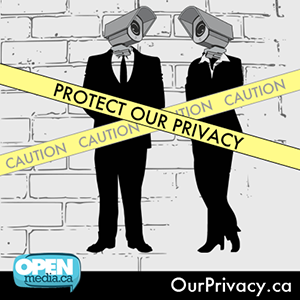Canadians have been speaking out in huge numbersabout the government’s mass surveillance of law-abiding citizens. For some time now, debate has focused on how many of our telecom companies appear to be cooperating with warrantless surveillance requests from government agencies. Just weeks ago it was revealed that there were over 1.2 million such requests in a single 12 month period. That’s once every 27 seconds – it’s a huge problem.
Your OpenMedia team has been working with some of the top experts in the Protect our Privacy Coalition to shed some light on all this. Back in January, privacy coalition experts led by Citizen Lab’s Dr Chris Parsons, sent a letter to 16 telecom companies, large and small, requesting details about the extent to which they were helping the government to spy on law-abiding citizens. The response was underwhelming: most telecom firmsrefused to answer the specific questions put to them, instead often resorting to vague generalizations about their privacy policies.
Then, in April, a groundbreaking report spearheaded by Prof. Andrew Clement and Dr. Jonathan Obar at the University of Toronto, revealed just how far telecom companies had to go to be more transparent about how they handle our private information. The report found that while all providers had room for improvement, smaller independent providers tend to be more transparent overall than their larger counterparts.
With tens of thousands of citizens joining with experts to call for greater transparency, it didn’t take long for our campaign to start winning results. Now it seems that at least one independent Internet provider is heeding Canadians’ call for action. This week, independent ISP TekSavvy became the first Internet provider to release a detailed report about how, when, and why it does and does not cooperate with warrantless government requests for private information.
TekSavvy’s report, which you can check out here, makes for very interesting reading, and provides detail on both the number of government requests and the number of times TekSavvy provided information. They received 52 government requests in 2012 and 2013, and responded to just 17 of them.
The report also provides detailed responses to the range of questions posed by privacy coalition experts – and it underlined TekSavvy’s commitment to greater privacy transparency going forward. TekSavvy say they’re undertaking a thorough review of how they protect their customers’ privacy – and that the privacy coalition’s “questions and suggestions have been an important tool in focusing that review.”
All this is to be welcomed, and it comes in striking contrast to how the giant telecom companies are responding to public concern. Despite their far greater resources, none of Canada’s Big Three telecom giants have revealed how many times they handed their customers’ sensitive information to the government.
The contrast between TekSavvy’s detailed 16-page report and telecom giant Rogers’ flimsy 4-page attempt at a “transparency report” could not be more striking. Rogers’ report, the entire first page of which is just images, sticks to bland generalities and steers clear of offering detailed information except under the broadest of headings.
We did learn that the government requested information from Rogers a staggering 174,917 times in 2013 alone. But, as Prof. Michael Geist points out, Rogers shockingly did not even keep track of how many times it handed its customers’ private information over to the government without a warrant. And Telus and Bell are even worse – neither has even produced a transparency report yet (Telus says it plans to this summer), despite that being standard practice for large telecoms in other industrialized nations.
With so many Canadians depending on the Big Three to keep their privacy safe, it’s just not good enough for Big Telecom to hide behind obfuscation and vague generalities. Canadians deserve to know how their privacy is protected, and they deserve to know precisely how many times the telecom giants hand over their private information without a warrant or any judicial oversight.
And, with yesterday’s shocking revelations that many governments have a “direct line” into networks owned by multinational UK telecom giant Vodafone – a line that enables governments to listen to every phone call on the network – it’s absolutely crucial that Canada’s telecom giants come clean about whether or not something similar is happening here.
Clearly our campaign is making headway – but it’s now more important than ever to keep up the pressure on the telecom giants who control most of the market. We’ll keep up that pressure over the months ahead to ensure other telecom companies follow TekSavvy’s example and come clean about what steps they plan to take to better safeguard their customers’ private information from government spies. Join the Privacy Coalition today and we’ll keep you in the loop every step of the way.



